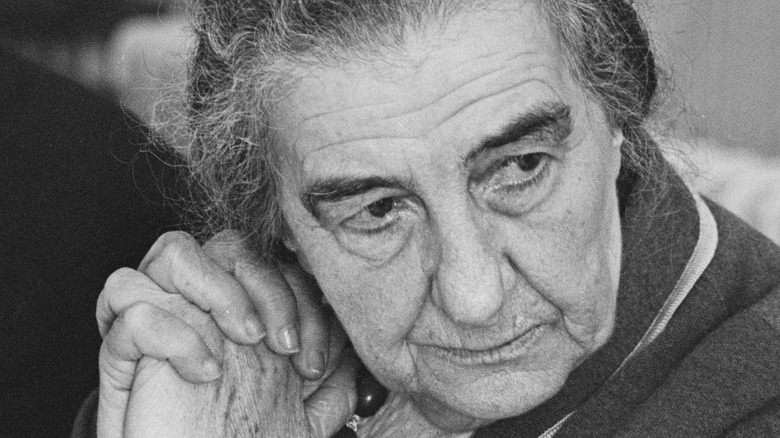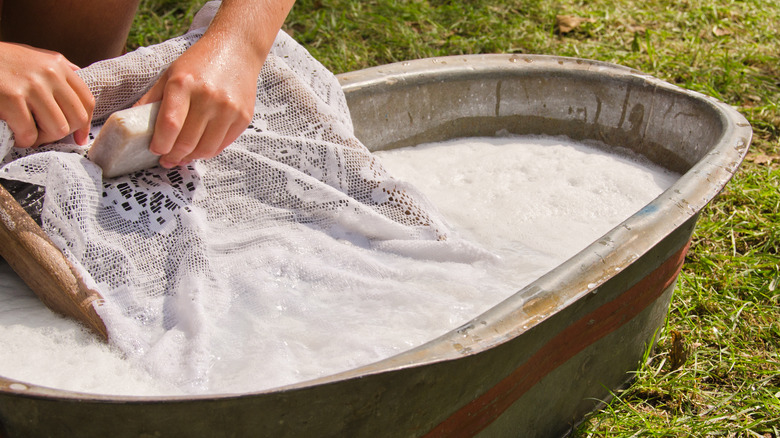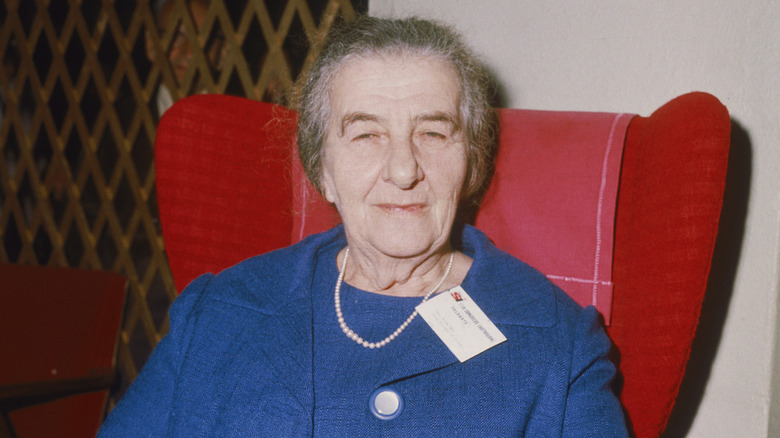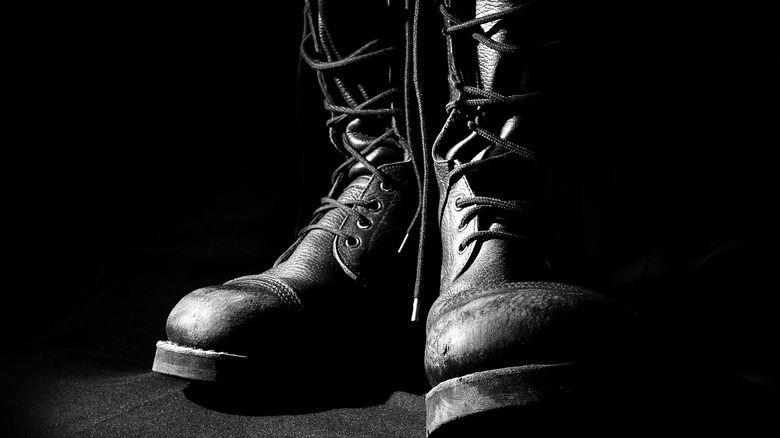The Untold Truth Of Golda Meir
It's nearly impossible to imagine the existence of the modern state of Israel without the many contributions of Golda Meir. Sometimes known as "The Iron Lady of the Middle East" (via Rosen School of Hebrew), Meir was among the early Zionist immigrants to the Palestine area, one of only two women to sign the Israeli Declaration of Independence in 1948, and served as its fourth prime minister (and first female prime minister) from 1969 to 1974. Following her resignation and retirement from politics, Meir went on to become one of the most-quoted political leaders in history, taking a seat in the pantheon next to figures like Winston Churchill and Abraham Lincoln.
It's clear that Israel as we know it wouldn't exist without the wit and leadership of Golda Meir — but how much do you know about her, really? Read on for some of the facts about Meir you may not have learned in history class.
Meir's namesake great-great grandmother put salt in her tea
Before wending her way to Israel, Golda Meir took a circuitous route through Ukraine and the United States. Born Golda Mabovitch in Kyiv to parents Moshe Mabovich and Blume Naiditch, she was named for her Great-Great-Grandmother Golda, who was known for putting salt instead of sugar in her tea as a way of mourning the Jewish diaspora. So, clearly, Golda's Zionist beliefs had deep roots.
In Kyiv, Golda's family lived in poverty and fear due to the near-constant threat of anti-Semitic pogroms, but Moshe eventually scraped together enough money to move his family to the United States, where they settled in Milwaukee, where Golda was enchanted by the "pretty new clothes, soda pop, and ice cream," according to her autobiography.
Although she graduated as valedictorian of her high school class (via Legacy.com), Golda's parents strongly discouraged her from pursuing further education, wanting her instead to find a husband and raise a family. Frustrated by their inability to see things her way, Golda escaped to her sister Sheyna's home in Denver, where she first encountered the Leftist Zionism that would define her career — and, ironically, Morris Meyerson, the man who would become her husband.
Golda Meir tried really hard to be a 'traditional' housewife
Golda's time in Denver — and her contact with Labor Zionists there — thoroughly radicalized her and convinced her of the need for a Jewish state in Palestine; it also convinced her parents to allow her to attend Milwaukee Normal School (now the University of Wisconsin, Milwaukee) and get her teaching certificate. Nevertheless, she didn't teach long — just a few years at a Hebrew school — because she found her true passion was in giving lectures on Labor Zionism on street corners. At the same time, Morris wanted to get married; Golda agreed on the condition that they move to Israel soon afterward, according to the Jewish Women's Archive.
In 1921, the recently married Meyersons moved to a kibbutz (a collectivist agricultural community) in Israel. There, Golda thrived, eventually heading up the kibbutz's entire chicken farming operation. Morris, meanwhile, was bored and listless — and contracted malaria. Golda wanted children, but Morris refused unless she agreed to be a "traditional" housewife (via Jewish Women's Archive).
She acquiesced, and the two moved to Jerusalem, where Golda gave birth to a son and a daughter — but on Morris's salary as bookkeeper, the family struggled to make ends meet. Golda begged and bartered and even did the laundry at their children's school, but the family just couldn't make it work. Golda and Morris started living apart in 1928 and formally separated ten years later (though they never officially divorced).
She had 'no use for formalities'
Golda never really forgave herself for letting her home fall apart, writing, "I am not sure that I didn't harm the children." Despite her failure to constrain herself to a life as a housewife, though, Golda wasn't ambitious on a personal level — or, at the very least, she didn't give that outward impression. Even as she ascended the ranks of power in the emerging nation of Israel — becoming ambassador to the Soviet Union, then minister of labor, then minister of foreign affairs, and eventually (of course) prime minister, Meir (who Hebraicized her surname Meyerson in 1956 at the behest of then–minister of foreign affairs Moshe Sharett) was known for doing things simply and humbly. She flew coach, washed her own underwear (by hand), and shined her own shoes. She was even known for entertaining foreign dignitaries in her own kitchen, often serving them homemade pastries while they discussed matters of state.
In fact, Meir's priorities seem to always have been the political future of Israel rather than her own ambitions. Meir even engaged in a bit of espionage (of sorts) — in 1948, when tensions were rising between Israel and its Arab neighbors, Meir risked her life, disguising herself as an Arab to pass through the battle lines and convince King Abdullah I of Jordan not to join the hostilities (via Biography).
Golda Meir wanted to retire in 1966
Keeping with that theme of a seeming lack of personal ambition, we should note that Meir never openly aspired to be Israel's prime minister. According to Mental Floss, she was diagnosed with lymphoma in 1965; by the following year, she was 68, a grandmother, and ready to slow down and enjoy her final years. She resigned as minister of foreign affairs, but Mapai, her political party, persuaded her to stay on as secretary general for the party. In 1968, Mapai merged with two other parties to become the Labor Party (via Israel Democracy Institute), for which she continued to serve as the secretary — and then, in 1969, Labor prime minister Levi Eshkol died suddenly of a heart attack. Desperate to prevent a power struggle, Labor leadership pressed Meir into taking the position (via Jewish Women's Archive).
For the first few months of her stint as prime minister, many regarded her as an interim figure or a stopgap, but Meir silenced most of them by winning a general election held later that year. She remained in power until 1974 — when the Labor Party was blamed for the massive Israeli casualties suffered in the Yom Kippur War and voted out of office (via The Middle East Journal). Having served Israel for more than 50 years, Meir finally retired.
She inspired the womens' shoes in the Israeli army's uniform
Perhaps Golda Meir's most unlikely legacy was the official women's footwear of the Israeli army. Until 1987, the Israeli military — which drafts all Israeli citizens, men and women, for two or three years of mandatory service — issued all female recruits a pair of clunky, reportedly uncomfortable shoes that were allegedly based on the orthopedic shoes Meir favored later in her life. According to the Associated Press, most pairs of what soldiers called na'alei Golda ("Golda's shoes") ended up buried in the backs of closets as recruits preferred to wear almost anything else, and by the end of the 1980s, the military had discontinued standard-issue footwear entirely, allowing recruits to choose their own shoes. By 2009, Stars and Stripes was reporting that Israeli soldiers could be spotted wearing anything up to and including flipflops.
Meir got to enjoy her retirement for only four years before passing away in 1978, but she left behind an entire nation as her legacy.





